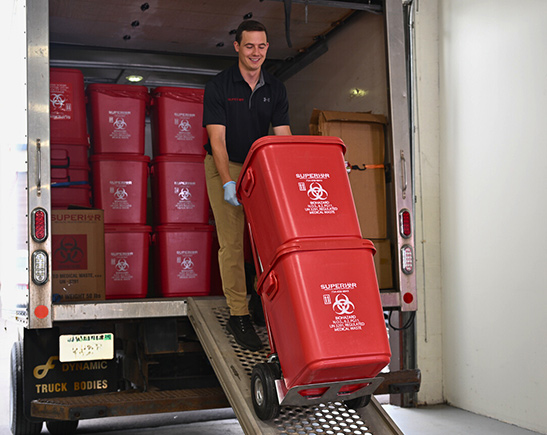Expertise Unleashed: Understanding the Art of Medical Waste Removal for Wellness Facilities
Expertise Unleashed: Understanding the Art of Medical Waste Removal for Wellness Facilities
Blog Article
The Relevance of Appropriate Waste Disposal Practices
From the effects of inappropriate waste disposal on our atmosphere to the long-term effects for future generations, the relevance of embracing sustainable waste management techniques can not be overemphasized. By exploring the environmental impact of irresponsible waste disposal, the benefits of recycling campaigns, and the importance of neighborhood involvement in waste reduction initiatives, a deeper understanding of why proper waste disposal methods are essential emerges.
Ecological Influence of Improper Disposal
Inappropriate disposal of waste poses a significant threat to the atmosphere due to its destructive effects on communities and human wellness. When waste is not effectively handled, it can result in air pollution of the air, water, and soil, causing harm to different plant and animal varieties. click here. Chemicals and toxins from poorly disposed waste can seep right into the ground, infecting groundwater resources and impacting the health of both wildlife and human beings
Moreover, the accumulation of waste in land fills generates greenhouse gases like methane, adding to environment adjustment and global warming. Improper disposal techniques likewise cause littering, which not just weakens the visual value of the setting however can also harm wild animals via intake or entanglement.
To reduce these ecological impacts, it is important for individuals and neighborhoods to embrace correct waste disposal methods such as recycling, composting, and liable dangerous waste disposal. By taking these actions, we can help shield communities, maintain all-natural sources, and secure human health and wellness for future and current generations.
Benefits of Recycling Programs
Frequently getting involved in recycling programs offers countless advantages for both the setting and society as a whole. This preservation of sources not just assists in maintaining ecological equilibrium but likewise contributes to lasting development.
In addition, recycling plays a critical role in reducing energy usage and greenhouse gas emissions. The production of goods from recycled products normally requires less power contrasted to producing from virgin resources - medical waste removal service. As an outcome, the carbon impact connected with the production procedure is substantially reduced, assisting in the fight against climate change
In addition, recycling programs produce task chances in the reusing sector, advertising economic development and social well-being. By motivating the recycling and reuse of materials, these programs support a circular economy that decreases waste generation and optimizes source efficiency, inevitably leading to a cleaner, greener future for generations to come.
Hazardous Waste Management Guidelines
Implementing effective contaminated materials administration guidelines is critical for reducing ecological and health and wellness risks related to the incorrect disposal of dangerous products - click here. Proper handling, therapy, and disposal of hazardous waste are necessary to stop contamination of dirt, water resources, and air
One key guideline is proper labeling of contaminated materials containers to make certain secure handling and transport. Additionally, centers must adhere to strict storage space demands to stop leakages, spills, or mishaps that might threaten human health and the environment. Normal training programs for staff members on unsafe waste administration methods are also vital to ensure conformity with laws and advertise a culture of safety.
Additionally, dangerous waste must be set apart based on its properties to avoid chemical reactions that could bring about hazardous situations. Implementing an extensive waste tracking system can help check the motion of harmful materials from generation to disposal, guaranteeing openness and responsibility. By following these standards carefully, services and sectors can contribute to a more secure and cleaner environment for existing and future generations.
Neighborhood Involvement in Waste Decrease
To effectively address the ecological and health threats connected with unsafe waste management, involving the neighborhood in waste reduction campaigns is critical. Area involvement plays a critical function in advertising lasting waste administration techniques and cultivating a culture of environmental duty. By informing residents concerning proper waste partition, recycling, and composting strategies, neighborhoods can considerably minimize the amount of waste sent out to landfills, therefore reducing environmental air pollution and preserving natural sources.
Area participation in waste reduction programs also assists in increasing understanding regarding the relevance of waste reduction and encourages individuals to adopt green habits in their daily lives - medical waste disposal. Collaborative efforts between regional authorities, waste administration firms, and area participants can lead to the application of reliable waste decrease techniques customized to the details needs of each community or town
Moreover, neighborhood engagement promotes a sense of ownership and accountability among homeowners, empowering them to take positive actions towards decreasing waste generation and advertising a cleaner, much healthier setting for existing and future generations. By functioning with each other towards typical waste decrease objectives, communities can make a considerable influence on minimizing the adverse effects of inappropriate waste disposal methods.

Future of Sustainable Waste Practices
The development of lasting waste techniques is vital for advancing environmental stewardship and source preservation in the coming years. As the international population remains to grow, so does the quantity of waste generated (medical waste disposal). Standard garbage disposal methods, such as landfilling and incineration, are no much longer sustainable in the long term because of their significant environmental impacts. Moving on, the future of lasting waste practices hinges on accepting a round economic climate approach, where sources are recycled, recycled, or repurposed to minimize waste generation.
Technical innovations play a key role fit the future of sustainable waste methods. Advanced waste sorting and reusing modern technologies can aid boost the efficiency of waste management processes, enabling for the recuperation of beneficial sources from waste streams. Additionally, the adoption of biodegradable products and composting methods can help in reducing the quantity of organic waste winding up in garbage dumps, therefore reducing greenhouse gas exhausts.
Additionally, advertising consumer recognition and education and learning on correct waste partition and disposal techniques is essential for driving behavior modification towards sustainability. By fostering a society of waste reuse, recycling, and decrease, areas can jointly contribute to a cleaner and healthier setting for future generations.

Conclusion
In final thought, proper garbage disposal practices are critical for lessening environmental effect and advertising sustainability. By carrying out recycling programs, taking care of contaminated materials properly, and motivating community participation in waste reduction initiatives, we can work in the direction of a cleaner and healthier environment. It is essential for federal governments, businesses, and people to focus on sustainable waste techniques for the future wellness of our earth.

From the effects of incorrect waste disposal on our environment to the long-term implications for future generations, the importance of embracing sustainable waste management techniques can not be overemphasized. view website By checking out the environmental impact of irresponsible waste disposal, the advantages of reusing efforts, and the significance of community involvement in waste decrease efforts, a deeper understanding of why proper waste disposal techniques are crucial arises.
By informing locals about correct waste partition, recycling, and composting techniques, areas can dramatically lower the quantity of waste sent out to garbage dumps, consequently lessening environmental pollution and conserving natural resources. (click here)
Moving onward, the future of lasting waste methods lies in accepting a circular economic climate technique, where sources are reused, reused, or repurposed to lessen waste generation.
Advanced waste sorting and recycling technologies can help boost the performance of waste administration processes, permitting for the recovery of important sources from waste streams.
Report this page